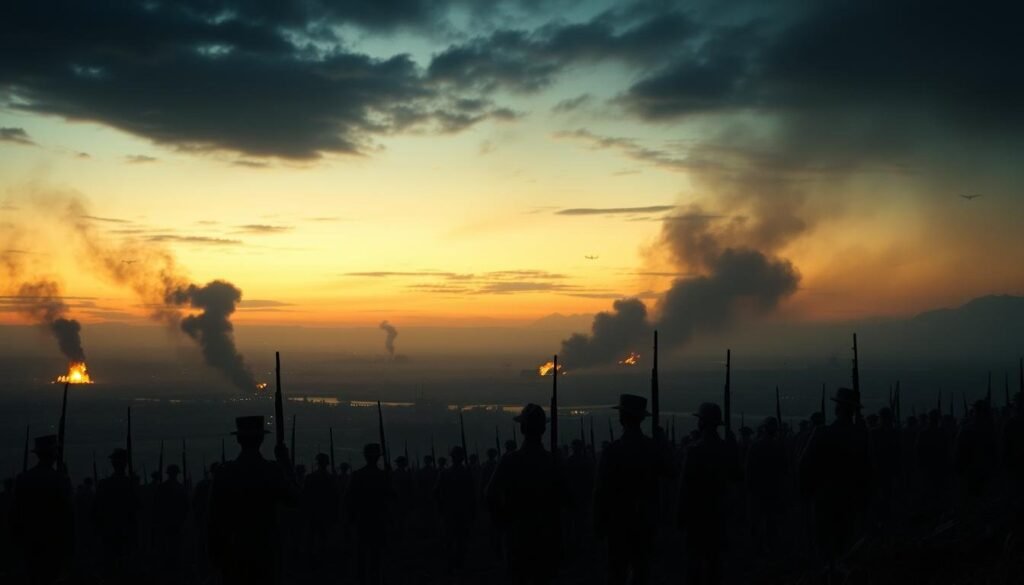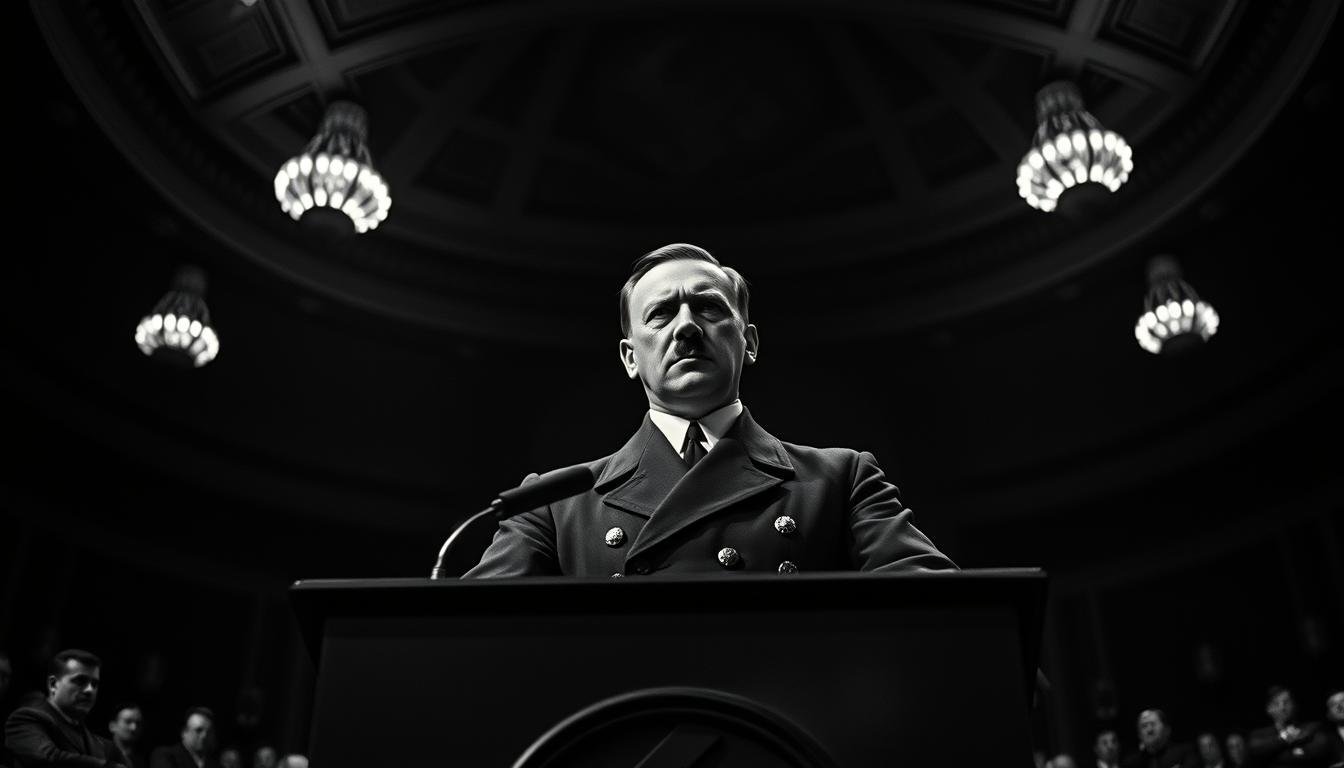Did Hitler Declare War on America? Have you ever wondered about the events that shaped the USA and Germany’s complex relationship in World War II? The question of whether Hitler declared war on America is fascinating. It requires us to understand the events leading up to the conflict.
The Pearl Harbor attack was a key moment that pulled America into the war. Knowing what happened before and after this attack helps us understand the USA and Germany’s relationship during WWII.
As you delve into this topic, you’ll learn about the historical context. You’ll also see how Hitler’s actions affected the world.
Contents
- 1 The Historical Context Before Pearl Harbor
- 2 America’s Path to War: 1939-1941
- 3 Pearl Harbor and the Japanese Attack
- 4 Did Hitler Declare War on America? The Facts
- 5 Motivations Behind Hitler’s Decision
- 6 Consequences of Hitler’s Declaration
- 7 Conclusion: Did Hitler Declare War on America?
- 8 FAQ
- 8.1 What were the main reasons behind Hitler’s decision to declare war on the United States?
- 8.2 How did the USS Greer and Reuben James incidents contribute to the U.S. entry into World War II?
- 8.3 What was the significance of the Pearl Harbor attack in relation to Hitler’s declaration of war?
- 8.4 How did Hitler’s declaration of war on America affect the course of World War II?
The Historical Context Before Pearl Harbor
The days before the Pearl Harbor attack saw rising tensions between the U.S. and the Axis powers. You might have noticed these growing hostilities. Yet, the U.S. government was careful, showing a historical lean towards isolationism.
Roosevelt’s team handled this delicate situation with skillful diplomacy. Key parts of Roosevelt’s foreign policy were:
- Maintaining diplomatic channels with Axis nations
- Implementing economic sanctions to curb aggression
- Preparing the military for potential conflict
Roosevelt’s Cautious Approach
Roosevelt walked a tightrope between diplomacy and military readiness. This is evident in the U.S.’s shift from isolationism to more intervention. This shift was in response to the growing threat from the Axis powers.
Before Pearl Harbor, Roosevelt made several strategic moves. These were aimed at stopping Axis aggression without starting a war. He increased military aid to allies and put economic sanctions on Axis nations.
America’s Path to War: 1939-1941
Between 1939 and 1941, a series of key events brought America closer to World War II. At first, the U.S. stayed neutral, not getting involved directly. But as the war grew, sea incidents and diplomatic issues made it harder to stay out.
The USS Greer incident was a big moment. In September 1941, the USS Greer faced off against a German U-boat. The details were debated, but it marked a shift in U.S.-Germany relations, raising tensions and moving the U.S. closer to war.
The USS Greer and Reuben James Incidents
After the USS Greer incident, the USS Reuben James was sunk by a German submarine in October 1941. Over 100 Americans died, changing public opinion in the U.S. towards war.
- The USS Greer incident heightened U.S.-Germany tensions.
- The sinking of the USS Reuben James resulted in significant American casualties.
- These incidents contributed to America’s eventual entry into WWII.
These events were key in America’s journey to war. They tested the U.S. neutrality policy and prepared the nation for war. The USS Greer and USS Reuben James incidents were crucial in shaping America’s response to the Axis powers.
By late 1941, the U.S. was ready to join World War II. Diplomatic, economic, and military factors pushed it towards war. The events of 1939-1941 set the stage for America’s rise as a global superpower.
Pearl Harbor and the Japanese Attack
On December 7, 1941, Japan surprised the U.S. with an attack on Pearl Harbor. This move pulled the U.S. into World War II. The U.S. Pacific Fleet suffered heavy losses, leading to a formal declaration of war against Japan.
The attack on Pearl Harbor was more than a surprise. It was Japan’s strategy to stop the U.S. from blocking its Asian expansion. But, this bold move drew in other Axis powers, changing the war’s course.
Germany’s Initial Response
After the Pearl Harbor attack, Germany’s leader, Adolf Hitler, watched closely. He wanted to support Japan but knew a war with the U.S. could be risky.
| Event | Date | Key Actor |
|---|---|---|
| Pearl Harbor Attack | December 7, 1941 | Japan |
| U.S. Declaration of War on Japan | December 8, 1941 | United States |
| Germany’s Declaration of War on U.S. | December 11, 1941 | Germany |
Germany’s declaration of war on the U.S. was a big step. It was driven by Hitler’s fear of the U.S. and his loyalty to Japan.
Did Hitler Declare War on America? The Facts
Hitler’s decision to declare war on the United States was not taken lightly. On December 11, 1941, he addressed the Reichstag, declaring war on America. This move was significant, marking a turning point in the global conflict.
Hitler’s declaration was not just a reaction to the Japanese attack on Pearl Harbor. It was a calculated move based on his perception of the United States and its role in the war. The accusations made by Hitler against the USA were multifaceted, ranging from economic interference to alleged belligerence.
Key Points and Accusations in Hitler’s Declaration
Hitler’s speech outlined several key points against the United States. These included:
- Accusations of American aggression against Germany, including the sinking of German ships.
- Claims that the U.S. was complicit in a Jewish conspiracy to destroy Germany.
- Assertions that America’s economic measures against Germany were acts of war.
| Accusation | Description | Hitler’s Claim |
|---|---|---|
| Economic Interference | U.S. economic sanctions against Germany | Acts of war |
| Alleged Belligerence | Sinking of German ships by the U.S. Navy | Aggression |
| Conspiracy Theories | U.S. support for Jewish interests | Part of a conspiracy against Germany |
The declaration of war by Hitler was a strategic decision. It aimed to bolster the Axis powers and create a united front against the Allies. However, it also had significant implications for Germany, drawing it into a war with a powerful industrial nation.
In conclusion, Hitler’s declaration of war on America was a complex decision. It was driven by a mix of ideological, strategic, and propagandistic motivations. Understanding the key points and accusations made by Hitler provides insight into the historical context of World War II.
Motivations Behind Hitler’s Decision
To understand Hitler’s decision to declare war on America, we must look into the Nazi ideology and strategic moves of WWII. We will see how these elements came together to create this major historical event.
Hitler’s choice was shaped by his beliefs, including dislike for America and a strong anti-communist stance. The Nazi regime saw the US as a capitalist foe. They saw a chance to attack when America was still recovering from Japan’s surprise attack on Pearl Harbor.
Strategically, Hitler wanted to keep America’s military away from Europe. But, this move actually made the Allied forces stronger.
Key Factors Influencing Hitler’s Decision
| Factor | Description | Impact |
|---|---|---|
| Nazi Ideology | Anti-American and anti-communist beliefs | Led to a declaration of war |
| Strategic Decisions | Preventing US focus on Europe | Strengthened Allied forces |
| Political Alliances | Supporting Japan after Pearl Harbor | Unified US and UK against Axis powers |
Hitler’s decision to declare war on America was complex. It was driven by both his beliefs and strategic plans. This gives us a deeper look into the complexities of WWII.
Consequences of Hitler’s Declaration
Exploring World War II’s history, it’s key to grasp Hitler’s war declaration on the U.S. This move deeply affected the war’s global dynamics.
How Hitler’s Decision Shaped the Course of World War II
Hitler’s war declaration on America changed the war’s path. The U.S., already aiding the Allies, became a full combatant. This shift brought strategic implications, as America’s industrial power was now against the Axis.

The war’s impact was wide-ranging. The U.S. and U.K. strengthened their alliance, improving their position. Germany faced war on multiple fronts, weakening its military. This decision played a big role in the Axis’s downfall.
Hitler’s declaration had far-reaching effects, shaping the war’s outcome. Understanding these effects gives you a deeper look into the war’s complex dynamics.
Conclusion: Did Hitler Declare War on America?
You’ve learned about the complex history behind Hitler’s declaration of war on America. This event is key to understanding World War II. It marked a big step up in the war and changed its course and outcome.
The impact of WWII still shapes global politics and values today. Thinking about the lessons from this time shows how leaders’ choices affect us all. Hitler’s decision to declare war on America is a clear example of how big decisions can change history.
Looking into Hitler’s reasons and the war’s effects helps us understand the value of diplomacy and careful planning. Remembering this event teaches us important lessons for the future. It reminds us to stay alert to new threats and to make wise choices.
See Also: How Did Hitler’s Siblings Die?
FAQ
What were the main reasons behind Hitler’s decision to declare war on the United States?
Hitler wanted to fight the U.S. for several reasons. He saw the U.S. as a threat to Nazi Germany. He also wanted to help Japan after the Pearl Harbor attack.
How did the USS Greer and Reuben James incidents contribute to the U.S. entry into World War II?
The USS Greer and Reuben James incidents raised tensions with Nazi Germany. They pushed the U.S. towards more involvement in the war. This led to the U.S. joining World War II.
What was the significance of the Pearl Harbor attack in relation to Hitler’s declaration of war?
The Pearl Harbor attack brought the U.S. into World War II. Hitler declared war on the U.S. to support Japan and expand the conflict.
How did Hitler’s declaration of war on America affect the course of World War II?
Hitler’s declaration of war on America brought the U.S. into the European theater. This move helped the Allies win the war and shaped its outcome.

Jayceon Schaefer, a social worker from Wailuku, Hawaii, is passionate about history. He created HitlerStory.com to share his deep interest in Adolf Hitler and explore complex historical topics through writing.

